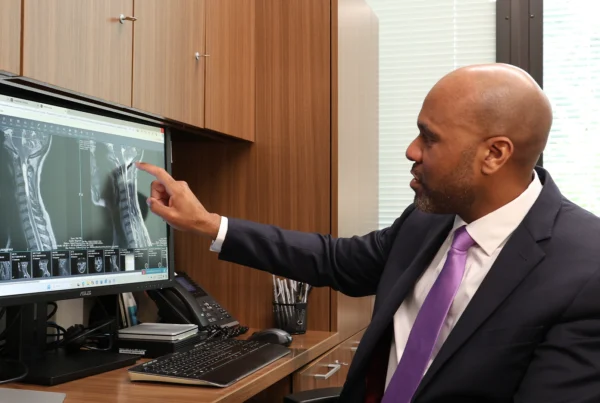Benign nerve sheath tumors are nervous system disorders that can come in many different forms. They are very amenable to treatment, but sometimes the best option is no treatment at all. Depending on the details of your condition, leaving your benign nerve sheath tumor alone may be your best choice. Before you and your doctor make that decision, however, you should understand the risks. What follows is an overview of benign nerve sheath tumors and the risks of leaving them untreated.
Overview of Benign Nerve Sheath Tumors
Benign nerve sheath tumors can occur anywhere within what is called the peripheral nervous system, meaning they stem from the network of nerves that connects the various parts of your body to your brain and spinal cord. Nerves all over your body send signals using long fibers that are covered in myelin, a substance also known as the “nerve sheath.” Myelin protects nerve fibers from damage and improves the speed of nerve signaling, but the cells that produce it sometimes malfunction and grow out of control.
When the cells around the nerve sheath develop a genetic mutation, they can grow uncontrollably, and form a nerve sheath tumor. Most of these tumors are solitary and occur in patients without any genetic predisposition. Such tumors are called “sporadic.” Some people have a propensity to have multiple tumors and other abnormalities associated with a genetic syndrome called neurofibromatosis.
Malignant / Benign
Nerve sheath tumors come in many different varieties, but the most important distinction is whether yours is malignant or benign. Malignant nerve sheath tumors grow and spread quickly, while benign nerve sheath tumors grow slowly and usually don’t represent an immediate risk to your health. Fortunately malignant nerve sheath tumors are extremely rare. Benign nerve sheath tumors can be further divided into schwannomas and neurofibromas. The treatment options of these benign tumors is more or less the same.
Diagnosis
To determine your diagnosis, your doctor will likely perform a combination of a physical examination and an MRI. Nerve sheath tumors often have a characteristic appearance on MRI that renders any other diagnosis extremely unlikely. For this reason, biopsy is rarely needed and treatment is often guided by what is called a “presumptive diagnosis.” This means the diagnosis of benign nerve sheath tumor is presumed based on a very characteristic appearance on MRI.
Risks of Leaving a Benign Nerve Sheath Tumor
While benign nerve sheath tumors sometimes need no treatment, there are risks to leaving them that should be carefully considered before you and your doctor decide on which approach to take. Here is an overview of the main risks of leaving a benign nerve sheath tumor:
It's time to get back
to doing what you love.
Additional Growth
As with many types of tumors, a benign nerve sheath tumor left untreated may continue to grow. Even if it remains benign and grows very slowly, it can gradually disrupt the function of surrounding nerves, resulting in pain or loss of neurological function. Therefore, if treatment is deferred, careful observation with periodic MRIs is required. If a tumor is growing over time, it should be removed if it expected to become symptomatic within the patient’s lifetime. In such cases, there is no advantage to delay. Delay can make the surgery more difficult and has the potential to affect the final outcome.
Chance of Malignancy
The conversion of a benign tumor to a malignant one is extremely rare in patients with solitary or “sporadic” tumors. It is more likely in patients with neurofibromatosis, but still unusual. Although it is true that surgery earlier on could prevent this unfortunate event, it is so rare, even in patients with neurofibromatosis, that it is not considered a reason, in and of itself, to have surgery. Nevertheless, malignant conversion is an important management concern, particularly in patients with neurofibromatosis who often have multiple tumors that are being followed radiographically. Any sudden change in the growth rate or appearance of a tumor being monitored with periodic MRIs should prompt the appropriate medical response.
The Presumed Diagnosis is in Question
Sometimes it is very hard to tell with reasonable certainty if a tumor seen on MRI is a benign nerve sheath tumor or something else. This is particularly important if the tumor in question could be an ependymoma, another type of benign tumor for which early surgery is often recommended. If the presumptive diagnosis is in doubt, it may be advisable to remove a tumor, rather than watching it. This is a complex issue that you should discuss thoroughly with your doctor.
When Should a Benign Nerve Sheath Tumor Be Left?
Although surgery is a very effective treatment for benign nerve sheath tumors, leaving it alone and instituting a careful surveillance plan can sometimes be the best option. There are several factors that determine whether leaving a benign nerve sheath tumor is the way to go, but the most important are whether it is symptomatic, where it is located, how large is it, how quickly is it growing, does it have a very characteristic appearance on MRI, and what is the likelihood of its being or becoming malignant.
Neurological Symptoms
If your tumor is compressing a nerve or the spinal cord and producing neurological symptoms, it should be removed.
Size and Location
If your doctor determines that your benign nerve sheath tumor isn’t growing or is growing very slowly, it may not require any treatment. Depending on its size and location, a slow-growing tumor usually doesn’t pose an immediate risk to your health.
Risk of Becoming Malignant
If your tumor doesn’t have a significant risk of being or becoming malignant, it may be best to leave it.
Impact on Quality of Life
Finally, an important factor to consider in determining whether your benign nerve sheath tumor should be left is its impact on your quality of life. Some people with benign nerve sheath tumors report significant pain, discomfort and range of motion deficits, while some report no such symptoms at all.
Before deciding on which treatment approach to take, it’s important to carefully consider these factors and discuss them with your doctor. In doing so, you can develop a clear understanding of how your benign nerve sheath tumor affects your health and how you and your doctor should address it.
Final Thoughts
Deciding what to do about your benign nerve sheath tumor can be difficult, but by continuing to do research and talking with your doctor, you can improve your understanding of your health and feel more confident about your condition. You can use this overview of the risks of leaving a benign nerve sheath tumor as a guide to form questions for your doctor.

About Dr. William S. Cobb
Dr. William Cobb is an accomplished neurosurgeon in North Jersey and a proud member of Neurosurgeons of New Jersey, practicing out of their Ridgewood office conveniently located on East Ridgewood Avenue. During his Neurological Surgery residency, he became passionate about the development and treatment of brain tumors affecting the brain and spine. Dr. Cobb uses state-of-the-art technology for surgical intervention in the treatment of tumors of the brain and spine including Gamma Knife radiosurgery. He has vast experience in using modern minimally invasive surgery for the treatment of degenerative spine and intervertebral disc disease. Dr. Cobb serves as the Director of Neurosurgical Oncology at Valley Hospital. He's accepting new patients.






